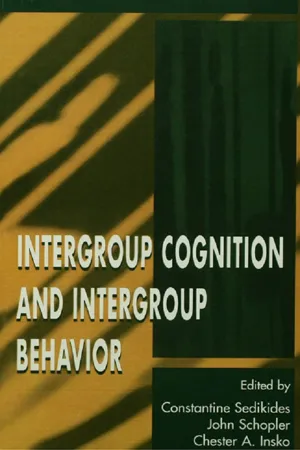
Intergroup Cognition and Intergroup Behavior
- 482 pages
- English
- ePUB (mobile friendly)
- Available on iOS & Android
Intergroup Cognition and Intergroup Behavior
About this book
Social psychology has maintained a keen interest over the years in issues related to intergroup behavior, such as ingroup favoritism and discrimination. The field has also been preoccupied with ways to reduce prejudice and discrimination. Intergroup contact has been offered as the main mechanism for prejudice and discrimination reduction. In the last 15 years, the social cognitive perspective has been applied to the study of intergroup relations. Theoretical advances have been made regarding such issues as the representation of information about ingroup and outgroup members, the structural properties of stereotypes, the relation between cognitive representation and judgment, and the ways in which cognition, effect, and motivation interactively influence the perception, judgment, and memory of ingroup and outgroup members.
The first volume in this new series, this book seeks to bring the above two traditions together. Focusing on the interplay between cognition and behavior in intergroup settings, it addresses four general questions:
* How does intergroup cognition (perceptions, judgments, and memories) influence intergroup behavior (ingroup favoritism and discrimination)?
* How does intergroup behavior subsequently change intergroup cognition?
* What is the mediational role of effect, motivational processes, and social context?
* How effective can change in intergroup cognition be in altering intergroup behavior?
This volume focuses not on a specific theory but rather on an approach. This approach is the interface between intergroup cognition and intergroup behavior. The various contributors are leading investigators in these areas and share the belief that the field has reached a level of maturity where it can start asking the hard questions regarding the complex and multifaceted ways in which intergroup cognition and behavior are related. The investigators do not just summarize their work. Instead, they connect aspects of their work to the theme of the volume and integrate their work with existing approaches in the relevant literature.
Tools to learn more effectively

Saving Books

Keyword Search

Annotating Text

Listen to it instead
Information
Table of contents
- Cover Page
- Half Title page
- Series page
- Title Page
- Copyright Page
- Dedication
- Contents
- Introduction
- I Intergroup Cognition and Intergroup Behavior Conceptual Issues
- II Interindividual Versus Intergroup Cognition and Behavior
- III Processes Affecting Intergroup Cognition and Intergroup Behavior Perceptual and Judgmental Processes
- IV Processes Affecting Intergroup Cognition and Behavior Motivational and Social Processes
- V On the Reduction of Unwanted Intergroup Cognition and Behavior
- VI Concluding Commentary
- Author Index
- Subject Index
Frequently asked questions
- Essential is ideal for learners and professionals who enjoy exploring a wide range of subjects. Access the Essential Library with 800,000+ trusted titles and best-sellers across business, personal growth, and the humanities. Includes unlimited reading time and Standard Read Aloud voice.
- Complete: Perfect for advanced learners and researchers needing full, unrestricted access. Unlock 1.4M+ books across hundreds of subjects, including academic and specialized titles. The Complete Plan also includes advanced features like Premium Read Aloud and Research Assistant.
Please note we cannot support devices running on iOS 13 and Android 7 or earlier. Learn more about using the app